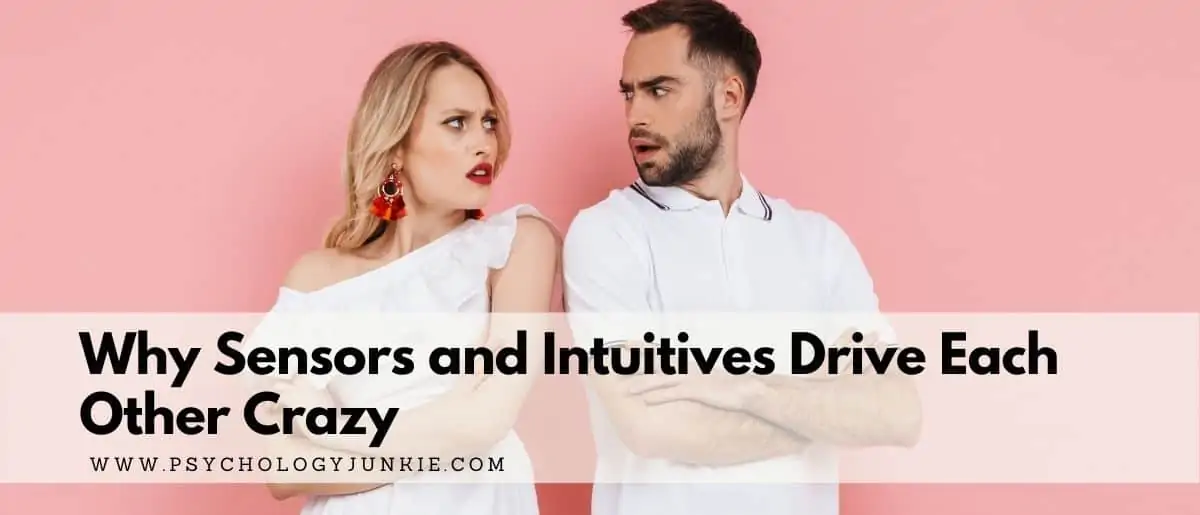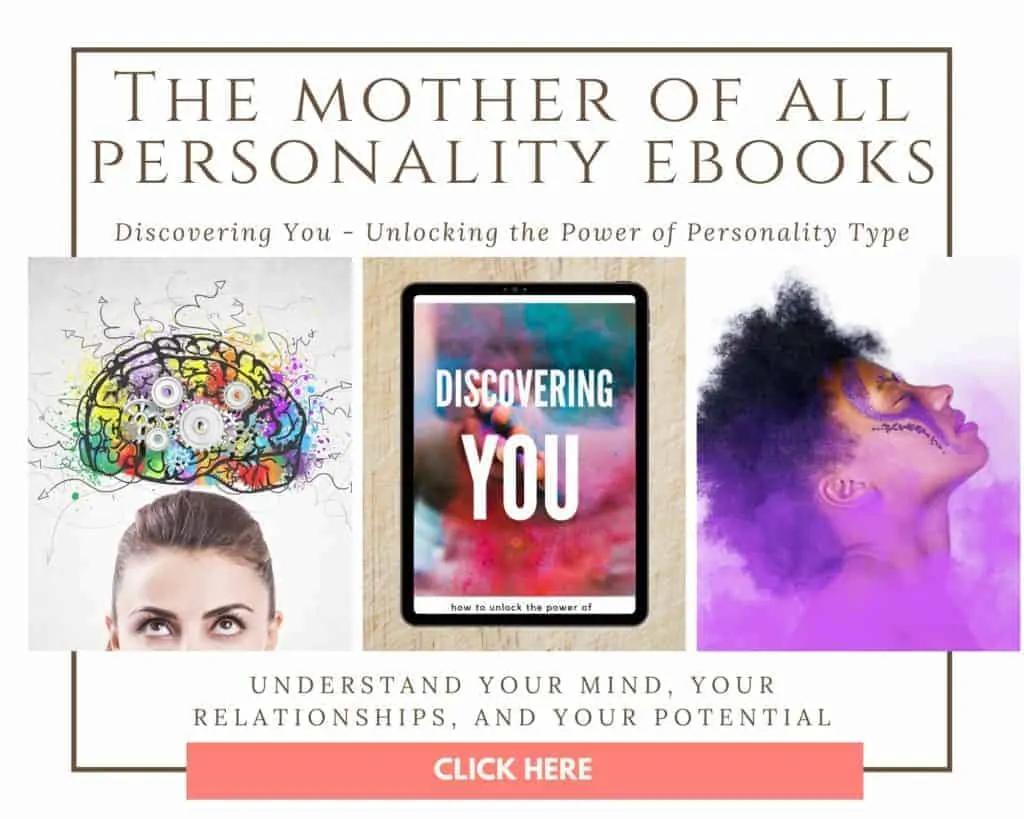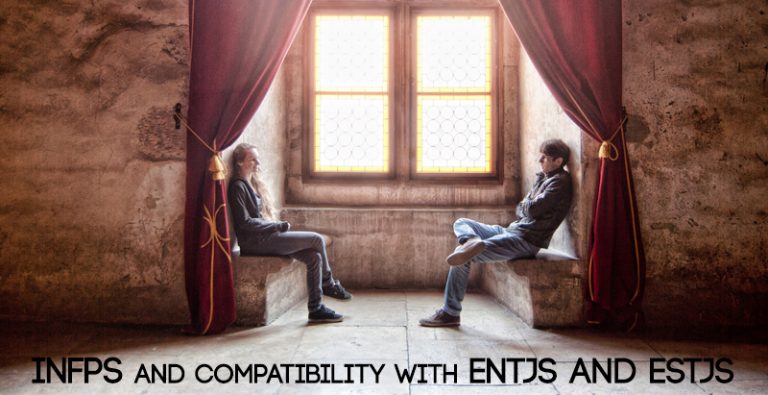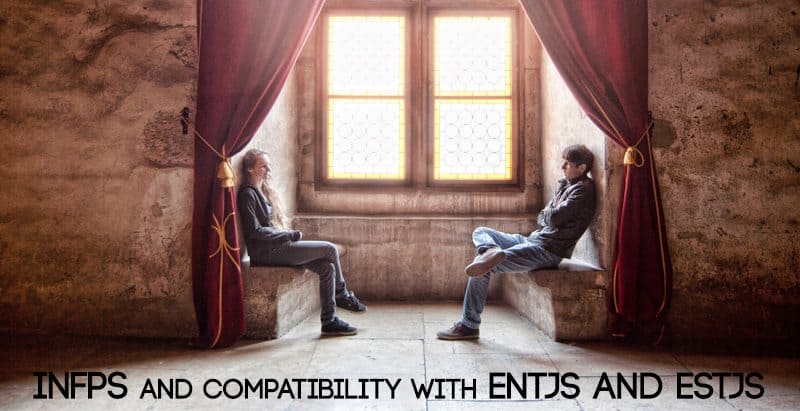Why Sensors and Intuitives Drive Each Other Crazy
Have you ever noticed that you struggle to find common ground with either Sensing or Intuitive personality types? In the Myers-Briggs® system, Sensors have an “S” as the second letter of their type code (for example: ESFJ) while Intuitives have an “N” as the second letter of their type code (ENFJ). The Sensing/Intuitive preference is confusing for a lot of people, especially because Intuition is often defined in Western culture as a kind of emotional awareness of how people are feeling (which in Myers-Briggs is more related to the Feeling preference).
Not sure what your personality type is? Take our new personality questionnaire here. Or you can take the official MBTI® here.

Table of contents
- Why can Sensors and Intuitives drive each other crazy?
- What Does Sensing Mean?
- What Does Intuition Mean?
- An S/N Example From My MBTI® Certification:
- Why Do Sensors and Intuitives Annoy Each Other?
- Sensors Focus On What Is Known While Intuitives Focus On What Is Unknown
- Why These Conversation Styles Can Cause Annoyance:
- The Sensing/Intuitive Difference in Relationships:
- So Can Intuitives and Sensors Have Happy Relationships?
- Figure Out What Your S/N Interests Are:
- Sensing and Intuition in Arguments or Education:
- How Sensors Can Understand Intuitives (and Cope with Differences):
- How Intuitives Can Understand Sensors (and Cope with Differences):
Estimated reading time: 14 minutes
Why can Sensors and Intuitives drive each other crazy?
It all boils down to perception. So before we go into the struggles these types have in understanding each other, let’s look at what Sensing and Intuition actually are.
What Does Sensing Mean?
Sensing is an information-gathering process that 8 of the Myers-Briggs personality types use. Sensing types gather information about the world around them by focusing first on concrete, tangible details and lived experiences. Sensors focus more on specifics than the big picture and prefer to deal with practical and factual details rather than patterns and theories. Sensors also prefer to attend to life in a step-by-step way and explain things in a linear, sequential way.
If you’re a Sensor, these statements would generally apply to you:
- I pay attention to details
- I’m in touch with physical realities
- I see and notice “little things” every day that other people miss
- I like attending to life in a step-by-step way
- I trust facts and my own lived experiences
- I prefer verifiable information to theories
- I have a talent for living in the moment
- I appreciate a straightforward communication style
- I prioritize being grounded and practical
What Does Intuition Mean?
Intuition is also an information-gathering process that 8 of the Myers-Briggs personality types use. Intuitives gather information about the world around them by focusing first on the overall picture, hunches, and possibilities beyond the facts. Intuitives look for patterns and hidden meanings and project what could or will happen in the future.
If you’re an Intuitive, these statements would generally apply to you:
- I focus on possibilities and ideas for the future
- I see patterns and meanings
- I get hunches “out of nowhere”
- I prefer imagining more than dealing with facts
- I look at the big picture more than the details
- I like “what if” questions and discussions about concepts and theories
- I prize symbolic meaning and metaphors or analogies
An S/N Example From My MBTI® Certification:
When I was getting certified as an MBTI® practitioner the instructor used an exercise to demonstrate the differences between Sensors and Intuitives.
First, he separated the sensors and intuitives into two separate tables. Next, he projected a picture of a painting onto the wall and asked all of us to look at it for ten seconds. The painting showed a busy, cluttered room with a man holding a marionette puppet. There were a lot of things to look at in the picture and ten seconds wasn’t nearly enough time to note them all.
After ten seconds, the instructor turned off the projection and turned the lights on. Each table was supposed to write down what they noticed about the picture and discuss it amongst themselves.
Finally, it was time to present our thoughts. The instructor started with the Sensors (a table of about eight individuals). They immediately started listing off details – a collection of numbers they’d seen, the variety of colors in the painting, the other toys that were laid out in various corners of the room. During the ten seconds, all of them had focused primarily on collecting facts and details about the painting as if they were going to be tested on their memory after the ten seconds were over.
Next, he asked the intuitive table (where I was) what we noticed about the picture. We talked about how we saw the puppet master as a symbol for God and we were trying to figure out whether he was good or evil. We noticed the window and wondered what was outside the window and whether the toys wanted to escape the room. We had been completely blind to many of the details the sensors had noticed, instead focusing on symbolic meanings or hidden messages.
This example is just one of the ways that a Sensing or Intuitive difference can show up in daily life. Sensors and Intuitives can drive each other crazy because they see and interpret things differently. Yet Sensors and Intuitives need each other for these very same reasons.
Why Do Sensors and Intuitives Annoy Each Other?
There are multiple answers to this question. But before I get into all the details, I want to clarify that while Sensors and Intuitives CAN drive each other crazy, they can also develop strong and lasting bonds. I’m an INFJ married to an ESTP and some of my dearest loved ones are Sensors. Having an S/N difference is by no means a prescription for bitter, tumultuous relationships. In fact, if anything, Sensors and Intuitives can help balance each other out. Intuitives can help Sensors to see the bigger picture and possibilities beyond the present and Sensors can help Intuitives to see the details, application, and relevant facts in the moment.
Sensors Focus On What Is Known While Intuitives Focus On What Is Unknown
Sensors enjoy discussing facts, details, and experiences. If you’re at a table of sensors, chances are they’ll be discussing the events of the week, their personal experiences, relationships, and stories from their lives. They may switch to talking about the details of their experiences – recipes they love, the best kind of bell peppers to use in a stir fry, or their plans for a work project they’re working on (these are all examples, but the specifics will vary). They may remark on the details of the room they’re in – quickly noticing if something has been moved or redecorated.
Sensing-Perceivers (ESFPs, ESTPs, ISFPs, ISTPs) will focus on taking action and experiencing the world around them in an immersive way. Adventure, opportunities, and rich experiences call to them with urgency. Thus they enjoy brainstorming fun activities that can be enjoyed in the moment or amping up the moment by listening to music, creating or tasting delicious foods, or making a game out of something. SPs like spontaneity and a casual but exciting lifestyle.
Sensing-Judgers (ESTJs, ESFJs, ISTJs, ISFJs) will focus on stability, routine, and tying up loose ends. They often enjoy recalling their experiences in vivid detail and learning about other people’s experiences. They enjoy perfecting the details of their lives. Conversation topics with SJs might include discussing the best way to refinish the floors in their home, things they’ve learned from past relationships, the best gardening technique for growing tomatoes, or productivity tips for balancing work and family life (these are all examples, the specifics will vary). For the Sensing-Judger, sharing life experiences and perfecting the details of their lives with factual, practical advice is crucial.
Intuitives enjoy discussing theories, concepts, and possibilities. If you’re at a table of Intuitives, chances are they’ll be discussing their ideas for the future, theories about something abstract, or examining a concept from multiple angles. Their discussion will be focused on what has inspired them – whether that be a concept, symbol, or idea. Rather than reflecting on past experiences, they’re more likely to focus on things that could happen in the future. Rather than focusing on details of what is known, they’ll focus on theories about what is unknown. Their conversations moves quickly, each intuitive seeing meanings and making associations without the need (or desire) for a linear, step-by-step explanation.
Intuitive-Perceivers (ENFPs, ENTPs, INFPs, INTPs) will focus on generating multiple possibilities and alternatives and exploring them out loud. They are more interested in creating new possibilities than narrowing them down. They can almost instantaneously see random connections between one thing and another. For example, they may be able to immediately crack a joke about how political parties are like the various foods at the snack table. They are typically lively, spontaneous, and curious; interested in life-changing transformations, ideas for the future, and possibilities they can imagine pursuing at any moment. They might discuss three new business ideas at once, an off-the-wall approach to dealing with tensions in the family, or brainstorm ideas for how to survive a zombie apocalypse.
Intuitive-Judgers (ENFJs, ENTJs, INFJs, INTJs) will focus on grand patterns, themes, and systems in order to understand the meaning behind things. They are interested in narrowing down possibilities and theories in order to find the one truth of what “will” come to pass. They often ask penetrating, thought-provoking questions and have a future-oriented focus on what will likely happen someday. Strategy, future-forecasting, and philosophical thought often draw them in. They will often try to turn small talk into a discussion of a bigger picture idea or meaning. They might discuss the long-range implications of the current political climate, discuss unseen issues in a relationship that others haven’t noticed, or debate the meaning of life itself and how different religions tie into that.
Why These Conversation Styles Can Cause Annoyance:
Sensors enjoy discussing facts and details from their lived experiences. Intuitives enjoy discussing possibilities and theories that could potentially happen. Immediately you may see a clash in conversation when Sensors and Intuitives are sitting at a table together making conversation.
Often what happens is that the outnumbered party (either Sensor or Intuitive) politely listens to whatever the majority is discussing, gradually tuning out more and more as they focus on their preferred thought patterns. At the end of the social engagement, the outnumbered party may walk away feeling bored and discontented.
A Caveat: There are times when sensors enjoy more intuitive-style conversation and vice versa. As sensors and intuitives reach mid-life and beyond they typically develop more interest in their non-preferred preferences and have a higher tolerance for discussion in those areas. At the same time, they will likely feel a little underwhelmed if they are always outnumbered by people with an opposite preference.
The Sensing/Intuitive Difference in Relationships:
In relationships, the Sensing/Intuition difference can be a difficult hurdle to jump at times. The Intuitive wants to discuss a theory or concept while the sensor wants to discuss their experiences that day or some facts and details. Over time both partners can feel like they’re running out of things to talk about.
The Sensing/Intuition difference can also create issues where both partners enjoy different types of activities.
As an INFJ, I enjoy playing strategy games (which make use of introverted intuition’s strategic nature) but my ESTP husband prefers speed-based games (which make use of his sensing ability to rapidly respond to current details and facts).
As an Introverted Intuitive, a fun night for me could involve reading C.S. Lewis and theorizing about what he wrote. I might also enjoy coming up with business plans that I can implement to create long-term rewards. My ESTP husband would rather play beat saber with me, swap massages, or watch “Fixer Upper” and talk about ways we could improve our home.
My attention is drawn to the theoretical. I like toying with concepts, strategies, and as-of-yet unlived possibilities. His attention is drawn to the experiential, practical, and tangible.
So Can Intuitives and Sensors Have Happy Relationships?
Absolutely! The truth is, we’re all (at times) interested in sensing or intuition – sometimes both at once! We just need to make sure that our preferred preference (either N or S) is satisfied on a regular basis. If you’re a Sensor married to an Intuitive, make sure you have other Sensors you can talk to and swap facts and experiences with. Spend time getting hands-on experiences and doing things that inspire you whether that be growing a kitchen garden or playing soccer with your friends. If you’re an Intuitive married to a Sensor, make sure you have other Intuitives you can talk to and theorize with. Spend time strategizing, exploring abstract ideas, imagining, and brainstorming ideas for your future (even if some of them may be “unrealistic”).
Figure Out What Your S/N Interests Are:
This is the part of the article where I remind you that all of us have access to both Sensing and Intuition. Just as we all have a preferred and non-preferred hand, we all have preferred and non-preferred preferences. A sensor still uses intuition, but they just prefer the world of sensation and blend into it more adeptly. An intuitive still uses sensation, but they just prefer the world of intuition and blend into it more adeptly.
I’m right-handed, but I type using both my right and left hands. In the same way, I’m an intuitive, but I use intuition and sensation frequently – I just blend into the intuitive world more easily.
We all have sensing and intuitive things we enjoy:
My ISTJ father-in-law loves science fiction and fantasy movies that deal with fictional universes and unknown, theoretical possibilities.
My ENTJ neighbor enjoys doing yardwork and making his lawn look beautiful.
My ESTP husband enjoys thinking up possibilities for his dream house, even if those possibilities aren’t attainable at the moment.
I (an INFJ) enjoy baking and experimenting with ingredients to come up with new pie and cake recipes.
I often connect with my Sensing husband by taking road trips with him or doing physical activity like hiking or ping-pong. When we’re driving, hiking, or otherwise physically engaged, he’s more open to discussing theories, possibilities, and strategies. Likewise, if I’ve had my intuitive needs met during my alone time, I’m much happier to focus on the facts and details my husband wants to talk about.
You can find out a lot more about Sensors and Intuitives and relationships (with tips for dealing with the differences) in my article: When Sensors and Intuitives Fall in Love.
Sensing and Intuition in Arguments or Education:
The S/N preference can also create struggles and opposition in arguments or in education.
When a Sensor argues a point or educates an individual, they focus on solid facts or lessons they’ve learned from firsthand experience. When they explain something, they explain it linearly, starting at the beginning and leading up to the main point.
When an Intuitive argues a point or educates an individual, they focus on connecting the dots, explaining those connections, or dealing with new theories. They tend to start with the main point when discussing something, rather than explaining the step-by-step history of how they got to that main point.
Thus, in arguments, or in student-teacher relationships, there can be frustrations with these differences.
Intuitives may be skeptical of the Sensor’s firsthand experience, and Sensors may be skeptical of the Intuitives pattern-finding. Intuitives may not trust the facts that the Sensor is presenting, and Sensors may not trust the new, unlived information that the Intuitive is using to strategize their plans. Intuitives may get bored with the detailed, linear information that the Sensor is using to describe something, while Sensors may get confused with the “start at the end, then explain the details later” speaking style that Intuitives use.
How Sensors Can Understand Intuitives (and Cope with Differences):
- Realize that they’re more interested in possibilities and theories than pre-existing facts and details.
- Understand that they don’t tend to explain or perceive things in a linear, sequential way. They tend to see things in connected bundles instead.
- Realize that they are more likely to see the big picture than the details. If they can’t connect something to a bigger picture or possibility, they may have a hard time being interested in it.
- Affirm and enjoy the perceptions and insights of the intuitives you love
- Try not to overwhelm them with details, especially if it’s not about something they’re already invested/interested in
- Realize that they are seeing another “side of the coin.” Take their perceptions seriously. But also realize that your perspective is valuable and make sure you’re balancing both.
- If you’re in a relationship with an Intuitive, check out When Sensors and Intuitives Fall in Love: A Guide to a Thriving Relationship
How Intuitives Can Understand Sensors (and Cope with Differences):
- Realize that they usually will need to hear the details and facts in order to invest in the big picture
- Understand that they will follow along in conversation more easily if you explain things in a linear way
- Affirm and enjoy the perceptions and insights of the sensors you love
- Try not to overwhelm them with theoretical possibilities and ideas. Try to stick to one at a time if possible.
- Realize that they are seeing another “side of the coin.” Take their perceptions seriously. But also realize that your perspective is valuable and make sure you’re balancing both.
- Focus on the real, the practical, and the immediate. Don’t overlook immediate concerns that are important to the sensor.
- Realize that they are more likely to see the details and nuances of something than the big-picture impression. The details are meaningful and significant to them.
- If you’re in a relationship with a Sensor, check out When Sensors and Intuitives Fall in Love: A Guide to a Thriving Relationship
What Are Your Thoughts?
Do you have any tips for fellow Sensors or Intuitives? Let us know in the comments!
Find out more about your personality type in our eBooks, Discovering You: Unlocking the Power of Personality Type, The INFJ – Understanding the Mystic, The INFP – Understanding the Dreamer, and The INTJ – Understanding the Strategist. You can also connect with me via Facebook, Instagram, or Twitter
Other Articles You Might Enjoy:
Why Judgers and Perceivers Drive Each Other Crazy
Here’s How You Use Your Intuition, Based On Your Personality Type
Your Biggest Relationship Fear, Based On Your Myers-Briggs® Personality Type


Subscribe to Our Newsletter

Want to discover more about personality type? Get the inside scoop with Susan Storm on all things typological, along with special subscriber freebies, and discounts on new eBooks and courses! Join our newsletter today!














I am an INFP. Here’s a common misunderstanding I have with sensors. Before I know someone well enough to know that person is a sensor, I will mistakenly assume they are intuitive. This happens when I talk about a ‘big idea’ or vision I have of something like ‘home’, and they come up with concrete details that seem to support or fill out that vision. I assume they got the concept, when, actually, they’re looking for more feedback. They’re trying to guess, not confirm!
im an intp, to me, the sensor way of thinking disgusts me
This information is amazing, thank you very much and congrats 🎉